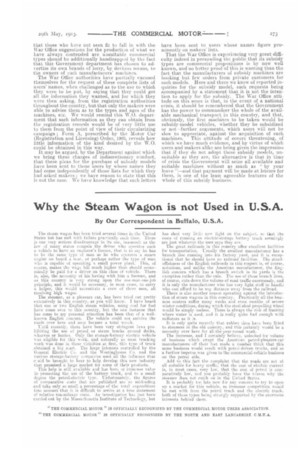Why the Steam Wagon is not Used in U.S.A.
Page 5

If you've noticed an error in this article please click here to report it so we can fix it.
By Our Correspondent in Buffalo, U.S.A.
Tho steam wagon has been tried several times in thelulled ftitates but has met with failure ['radically each time. There is one very serious disadvantage in its use, inasmuch as the law of many states compels the driver who operates such a vehicle to have an engineer's licence, that is to say he bus to be the seine LYPC' of man as he who cmerates a steam engine on board a beat, or perhaps rather the type of man who is capable of operating a small power plant. This, of course, makes the wage bill much higher than should economically be paid -Isr a driver on this class of vehicle. There is, also, the necessity of his having with him a. fireman, and as this country is very strung upon the one-man-one-job principle, and it would be necessary, in most cases, to carry a helper, this would necessitate a crew of three men, all receiving high wages.
The steamer, as a pleasure car, has been tried nut pretty extensively in this country, as you will know. I have heard that one or two English steam vehicles, using coal for fuel have come over to this country, hut the one instance that has come to my personal attention has been that of a wellknown English concern. The vehicle could not survive the roads over here and soon became a total wreck.
Until recently, there have been very stringent laws prohibiting the use of petrol or steam trucks around docks, wharves or ferries. Only the sturage-battery electric vehicle svas eligible for this work. and naturally as most trucking work was done in these viciuities at first, this type {If truck .obtained a big start, The large interests controlled by the General Electric Co. and the Westinghouse Cu. anci the various storage-battery compile:es used all the iiitluence that c nil he brought to bear to help develop this new industry that promised a large market for some of their products.
This help is still available and has bceu of immense value in preMoting the use of the battery truck, and to a small degree the petrol-electric type. tefortunately„ the figlitYBI of comoarative esets tint are published are BR mi4sading and take only so small a percentage of the total expenditure into account that ie is difficult to arrive at a trne statement of relative ton-mileage costs. Au illVestigation has just been carried out by the Massachusetts Institute of Technology, but has shed very Etas t. er light on the subject, ss tact the costs of running an eleetric-storaese battery truck seemingly are just whatever the user says they are. The great railrvads in this country offer excellent facilities for transportation. Usually the smallest manufacturer has a branch Ina, running into his factory yard, and it is exceptional that he should have no railroad facilities. The standoffishness of the English railroads in this respect is, of c.mrse, notorious, and unlike the American manufacturer, the English concern which has a branch switch in its yards is the exception rather than the rule. The use of these branch lines, of course, cuts down the volume of road traffic enormously, and it is only the manufacturer who has very light stuff to handle who can afford to be any distance away from the railroad.
There is also another reason operating against the introduction of steam wagons in this country. Practically all the bneiMSS centres suffer many weeks and even months of severe winter conditions, during which the steel-shod propelling wheel would be simply useless. There is always the risk of freezing where water is used, and it is really quite bad enough with radiators as it is_ It is only quite recently that rubber Ores have been fitted to steamers in the old 1:01111LB,y, and this certainly would be a necessity over here for all-the•year-taaind work.
The immense, and I certainly believe, unlooked for volume of business which swept the American petroi-pleasure.car manufacturers oft' their feet made a number think that this same business would result with petrol-driven trucks, and so a further impetus was given to the commercial-vehicle business on the petrol side.
Add to this fact the complaint that the roads arc not at all suitable for heavy traffic, that thu cusL of electric current is, in most .eases, very low, that the cost ef petrel 15 cowparativelv low, and you probably have the r.,asotz why the steamer does tint catch on in the United 'States.
It is probably too late now for any concern ti try to open lip a market for this vehicle, as immense camhetition would be met with from the petrol truck arid the electric truck. both. of the types being strongly supported by the enormous interests behind them.






























